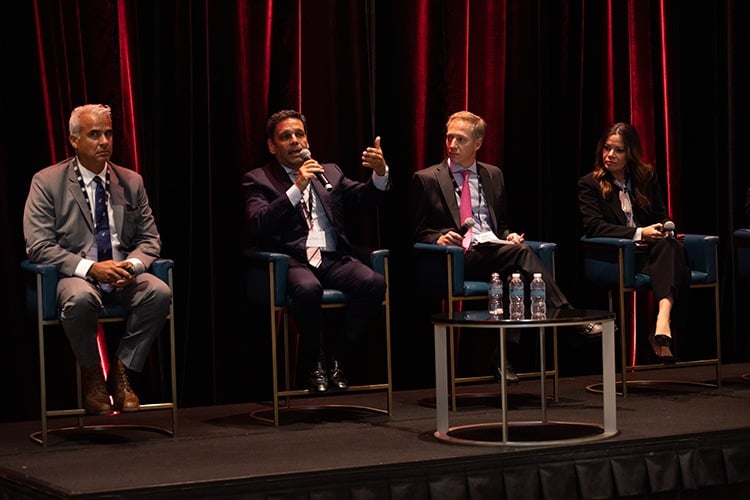Event Report
The Legal 500’s GC Summit Mexico 2022 on Thursday 23 June 2022 marked a welcome return to in-person events with in-house counsel in the region for the first time since late 2019. Despite closures on the Paseo de la Reforma (something of an unfortunate tradition!), approximately 90 in-house delegates from across the business spectrum arrived to listen to – and participate in – a series of four panel discussions on critical matters currently affecting business operations in the country.
With a busy agenda, after a brief introductory address and words of welcome from Tim Girven, editor of The Legal 500 Latin America, the event moved straight to our first panel, which focused on Mexico’s compliance landscape and the effect of recent political, economic and public health challenges post-pandemic. Chaired by Greenberg Traurig of counsel Pedro Reséndez, a heavy-weight line-up of speakers included Uber’s associate general counsel for Latin America, Carolina Machado; the general counsel for consumer and regulatory affairs at Citibanamex, Karla Valenzuela; former US Attorney for the Southern District of Florida (and current GT shareholder), Ben Greenberg; and Kyle Freeny, a former federal prosecutor for the Special Counsel’s Office and the Department of Justice (DoJ)’s Money Laundering and Asset Recovery Section. The conversation ranged across how recent political, economic and public health issues have modified Mexico’s compliance landscape, with the panel exploring issues ranging from the concerns of companies operating in Mexico in relation to anti-corruption, anti-money laundering and related investigations, through to the impact of remote working arrangements on compliance. It then sought to offer a number of practical solutions and indications regarding best practice. The subsequent Q&A proved even more wide-ranging, touching on matters such as whether risk management control should be part of the compliance function (or whether there is a conflict of interest); how a company can transform its start-up culture into that of a company with a structured compliance program; the difficulties of navigating the Mexican compliance landscape (given the lacunae that exist between Federal and state norms); and the degree of responsibility for ensuring compliance at third party business partners and suppliers in relation to applicable anti-corruption legislation (e.g. the FCPA and extra-territorial US legislation).
Moderated by Ritch Mueller’s Ricardo Calderón, our second panel looked at the issue of measuring and reporting ESG performance. Another powerful cross-industry line-up brought together Gustavo Alarcon, deputy general counsel of Industrias Peñoles; Javier Perochena, head of ESG solutions at Banco Santander Mexico and Luz Elena Gómez-Haro, director and corporate global compliance counsel at PepsiCo, along with Ritch Mueller partner Hector Garza. The discussion began by seeking to identify which entities constitute critical ESG standard-setters and which standards companies should prioritise complying with in what remains a rapidly evolving scenario. Noting the differences between the standards and frameworks established by rating agencies, data providers and other bodies, the discussion subsequently touched on the challenges presented by issues such as green- and gender-washing, and questions of transparency and accountability when it comes to accurate data reporting – especially given the ongoing uncertainty around regulatory requirements and compliance in general. The follow-on Q&A then took the discussion in a variety of directions, ranging from the extent to which a good ESG strategy adds value to a business (thereby becoming attractive despite the costs of implementation); whether frequent (& mandatory) compliance courses diminish risk (and indeed, whether they constitute a defence in cases of a compliance lapse); and crucially, the extent to which demonstrable ESG standards are likely to become indispensable for the obtaining of finance in the near future – or will at least bring preferable interest rates. The revision of ESG fulfilment by third-party suppliers and vendors; the active participation of employees in ESG policies and gender-balance as an ESG criteria (both internally and externally) were additional issues raised by the floor.
In terms of sheer passion it was difficult to outstrip our third panel which focused on Mexico’s contested Electricity Industry Law Reform (with a particular emphasis on the possibility of arbitration in relation to the conflicts in the sector). The panel, chaired by leading arbitrator Herfried Wöss, reviewed how – in April 2022 – the Mexican Supreme Court dismissed an Unconstitutionality Action against the contested Electricity Industry Reform before then turning to examine current problems with regard to the self-supply of electricity contracts and permits. Industry heavy-weight Hans-Joachim Kohlsdorf (managing partner at Efficient Ideas SA) then sought to clarify the current legal scenario (what does and does not remain in place from the Peña Nieto-era reforms as regards the power generation sector) and made an impassioned plea for the maintenance of legal norms and the need for the co-existence of the private sector in a Mexico with rapidly escalating energy needs – doing so before an audience that included in house counsel from state entities such as CFE and Pemex. The discussion, also involving Wöss Partners’ of counsel, Carlos Rodríguez Sámano, then examined the effects of the energy reform on the renewable-energy segment and how the self-supply regime is subject to arbitration. Subsequent questions necessarily touched on sensitive issues; for example, whether there are arbitral cases (and/or settlements) in which -in addition to the payment of damages- there had been a restitution in terms of shares or rights by Mexico – or indeed the elimination of a law of a law, regulation or norm; and whether, in the case of a possible investment arbitration, it was possible to anticipate legal -or extra-legal- reprisals on the part of the State. Arguably less tendentious matters included the panel’s opinion regarding what the correct formula for the granting of permits and the calculation of capacity percentages should be (and whether competition should be the determining factor); and what – come the close of this six-year governmental term – the tendencies and modifications of the self supply permits were likely to be.
Our final panel saw Miami-headquartered international firm Diaz Reus turn to look at the United States’ increasing focus on white-collar crime in México from the perspective of ‘what Mexican business needs to know’. Moderated by Javier Coronado, originally from the firm’s Bogotá office, a panel comprising Agustin Ballina Casares, JLL’s chief legal counsel and compliance officer for Mexico; Sandra L. Baez, a certified anti-money laundering specialist and management and program analyst at the Federal Bureau of Investigation; and the firm’s global managing partner, Michael Diaz Jr, the panel sought to drill down into the potential impact of US initiatives targeting criminal activity at companies and financial institutions in Mexico and identify the activities or practices that may trigger US anti-corruption and/or anti-money laundering enforcement. Concurrently, it examined the US legal remedies employed to identify, locate, secure and recover misappropriated funds and assets, as well as the US discovery tools available to obtain evidence in US territory for use in Mexican legal proceedings, including white-collar investigations and disputes. The discussion ranged across the increasing number of US initiatives to fight corruption, money laundering and human trafficking in Mexico – including Homeland Security’s Operation Sentinel – and the creation of special task forces to increase investigations, prosecutions and asset recoveries relating to criminal activity in Mexico, as based on the enforcement framework set forth by the FCPA, the Anti-Money Laundering Act and the Magnitsky Act. Once again the panel brought some interesting questions from the audience including on the relevance of the interface between the private and public sectors as a key nexus for the generation of corruption; issues surrounding the adoption of bitcoin as a national currency (such as in El Salvador) – notably, concerning how corruption and money laundering via crypto-currencies is being investigated; and anti-money laundering in relation to issues ranging from remittances from the US to arms trafficking.
The event was brought to a congenial close with a cocktail on the hotel terrace with delegates reflecting on the evolving landscape both of extra-territorial legislation concerning corruption and associated white-collar matters, and the parallel development of a body of norms, head-office mandated requirements and expectation around ESG matters, all of which are impacting upon the GC’s role and both day-to-day and strategic priorities.




